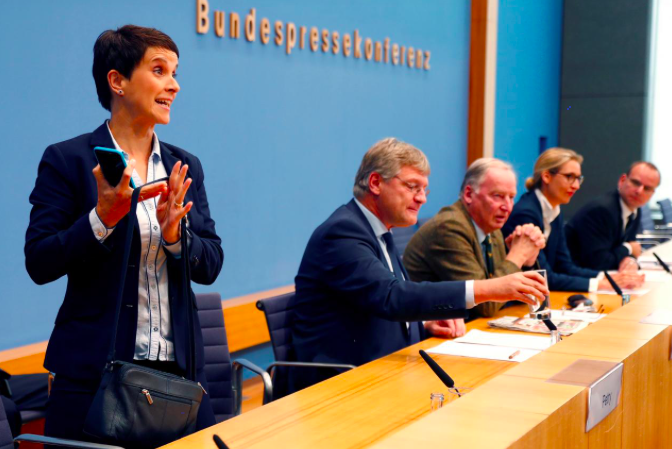Religious leaders speak out in horror at far right gains in German election

Religious leaders across all faiths in German are expressing shock at the gains made by the far right party Alternative for Germany (AfD) in Sunday's Bundestag election.
The AfD won 94 seats or 12.6 per cent of the vote, making it the third largest party in Germany's lower house of parliament and giving the far right parliamentary representation in Germany for the first time since the 1950s.
The right wing success comes at a time of rising antisemitism across Europe, as reflected in the horrified reactions of religious leaders, reported on the German website BR.de.
And the bishops and others spoke out as the party lurched even further to the right with the unexpected walk-out of its moderate chairwoman Frauke Petry, after she had come under increasing attack from the party's own right-wing.
Thomas Sternberg, president of the Central Committee of German Catholics, described the election as a 'bitter evening', adding: 'We hoped that it would not come to such a high number of votes'. But the church also had to attempt to understand and address the issue why so many people voted for such a party. Dialogue with Islam could be damaged by a strong AfD, he warned.
The President of the German Bishops' Conference, Cardinal Reinhard Marx, warned that every war has begun with the battle cry: 'Our nation first, we first.'
He said: 'We should not allow ourselves to be seduced. Christians must be the forerunners of togetherness, for before God what counts is not where we come from, but who we are.'
Evangelical Church council president Heinrich Bedford-Strohm said the success of the AfD was a 'wake-up call for all' concerned with a peaceful and cosmopolitan Germany. He described the suppression of speakers at election rallies and offensive campaign slogans as 'frightening expressions of a lack of political culture'. Everyone needs to work together to ensure that 'exclusion and hate-filled voices' do not poison life in Germany.
Josef Schuster, president of Jews in Germany, warned that Germany is facing its greatest democratic challenge since 1949. 'For the first time, a right-wing populist party, with a strong overlap to the right-wing extremist scene, has been elected to the Bundestag on this scale.'
Josef Schuster of the Central Council of the Jews said: 'I expect our democratic forces to unveil the true face of the AfD and unmask its empty promises.'
The chairman of the Central Council of Muslims in Germany, Aiman Mazyek, said: 'We Muslims are very insecure.' And Gökay Sofuoglu, the German President of the Turkish Community in Germany, said: 'We must make it clear that a diverse and open society is not a burden caused by immigration, but rather an opportunity to courageously rethink traditional methods and systems and enable equal opportunities for all people living in Germany.'
However, AfD co-founder Alexander Gauland said that 'Jews have nothing to fear'.
Speaking at a press conference he vowed to protect Germany from an 'invasion of foreigners' but said that the country's Jewish population was safe: 'There is nothing in our party, in our programme, that could disturb the Jewish people who live here in Germany.'











